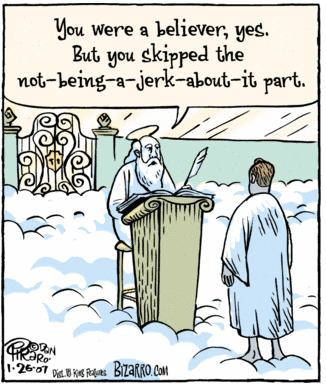Mood:
Topic: MyWords::RE::RandomStuff
Before I leap headlong into this issue, there are three peripheral observations that I would like to make---disclaimers, if you will ...
1. I am not a fan of polarized politics, especially when political values and faith become muddled, regardless of whether that muddling occurs on the right or on the left. Though I do not always agree with the values and beliefs of the sixteenth-century Anabaptists, I do deeply admire them, and I dislike Emperor Constantine and Eusebius of Caesarea because of their contributions to the intersection of Christian faith with political coercion. I also dislike Yorkshire Terriers ... but that has nothing to do with politics or religion.
2. I am annoyed by the fact that the Hate Crimes Bill is repeatedly represented as a Republican versus Democrat issue. Twenty-five Republicans voted for the bill, and 14 Democrats voted against it. Why must everything be painted in terms of such polarities?
3. I am honestly undecided about the validity and viability of the bill. My initial thoughts are that it seems unnecessary and that such laws should occur at the state and municipal levels---not at the federal level. At this point, however, my personal verdict is still out.
Now, for my more substantive thoughts ...
House Bill HR1592 specifically legislates against "violence motivated by the actual or perceived race, color, religion, national origin, gender, sexual orientation, gender identity, or disability of the victim." The primary reaction from politically-conservative evangelical Christians has been against the possibility that pastors or other religious leaders might have their freedom of speech limited by the fact that they might inadvertently incite or be accused of inciting potential or actual violence against homosexuals. That is, pastors may not have or may not feel as if they have the freedom to describe homosexual behavior as sinful.
Notice the content of these reactions carefully: Across the board, every negative reaction that I have read from evangelicals has to do with a fear of not being able to speak out against homosexual behavior.
(For the record, I do believe that homosexual behavior falls short of God's design for humanity and that, when addressing a text of Scripture that relates to homosexual activity, a pastor must describe such actions as sin. At the same time, without exception, homosexual persons should be treated with grace and mercy, as individuals created in the image of God.)
What I want to ask is this: Has no one noticed the full wording of this document? Allow me to cite the bill again---"violence motivated by the actual or perceived ... religion."
Religion ... that is, what someone believes and practices in relation to God.
Here's what I don't understand: Evangelical spokespersons seem far more concerned with protecting their right to speak against homosexual behavior than with protecting their right to speak against other religions.
When I proclaim that Jesus Christ is the only way to God, excluding all other paths and labeling as "false" all other faiths, I am in some sense speaking against other religions. So, if indeed this bill had the power to limit what a proclaimant of Scripture is able to say---and, please let me be clear, I am still not convinced that this bill could ever actually limit such proclamation---isn't the inclusion of "religion" more significant and more dangerous than the inclusion of "sexual orientation"? Has the moral issue of homosexuality become more significant to us than the centrality and exclusivity of Jesus Christ?
If so, this troubles me deeply.
The wrongness of homosexual behavior is, as I understand Holy Scripture, rooted in God's self-revelation in Genesis 1:26-28---in the truth that our creation as male and female is somehow rooted in the hypostatic unity of the threefold God. The sinful nature of sexual relationships outside the marital union of a woman and a man is, therefore, rooted in the nature and identity of God. This identity has been particularly and consummately revealed to humanity in Jesus Christ. As such, the right to proclaim the exclusivity of God's self-revelation in Jesus Christ is far more significant than the right to recognize the sinfulness of homosexual behavior.
I do not deny the need to recognize homosexual behavior as sinful; I do question the choice to focus on this right above and beyond the need to recognize Jesus Christ as the exclusive redeemer of humanity.
Am I the only one bothered by this?




